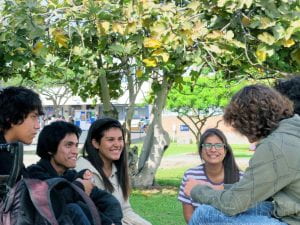Editor’s Letter: University Lessons
I learned about universities on the barricades. Well, not exactly. I was a philosophy student at Barnard—the women’s college at Columbia University—when the uprising began in 1968. Students, including my boyfriend and several classmates, took over buildings to protest a gym planned for nearby Morningside Heights. And then to protest the Vietnam war, racism, and unequal opportunities. I became a Sundial kid—one of the students who supported the building takeovers by picketing at the Columbia landmark and helping organize outdoor classes and teach-ins. Not exactly the barricades.
This ReVista issue focuses on universities, and specifically on Latin American universities. Yet, of all the ReVistas I have edited, I feel this theme spans across borders throughout the Western Hemisphere and beyond. The questions about access, affirmative action and opportunity, about quality and innovation, about the roles of public and private universities, indeed about what a university education is for, are burning issues in Latin America and throughout the world.
For me, in 1968 at Columbia, university education became not just Wittgenstein and Nietzsche, but thinking of the role of the university in the community. The protest originally sparked from that concern: Columbia’s relationship to neighboring African-American Harlem. University education was also learning from the world beyond the campus: Latin America was very real for us, and not only in our idealized versions of the Cuban Revolution and Che. We learned about student roles in the recent U.S. invasion of the Dominican Republic; we heard about the concept of Latin American university autonomy and student political activism. While the Columbia protests took place months before the tragic Tlatelolco massacre in Mexico City, Mexican students, Colombian students, Venezuelan students inspired us; so did the students on the streets of Paris and Prague. We lived in the world. The university was not a bubble.
Teach-ins were organized, but beyond that, we held classes on the lawns with sympathetic professors—sessions in which we tried to relate our book learning to what was going on around us. I kept on reading my philosophy texts more avidly than ever; the study of ethics took on a new vibrancy. Was it right to occupy buildings? What was the nature of democracy? Who did the universities belong to? We were “innovating” new ways to learn, although we probably never would have used that buzzword.
I am now reminded of Robert Fulghum’s book, All I Really Need to Know I Learned in Kindergarten. I feel that way about my experience in Columbia. The uprising made me see the university as a place that was much more than a collection of classrooms and smart professors. I realized that the university was indeed a hub of learning—but more than that, it played—and plays—a crucial role in shaping society’s relation to the community and the world. The years roll by and we are still asking: “what is the university’s place in the community? What is its place in the world? Is education a privilege or a right?”
Once again, students are protesting throughout Latin America, sometimes for more equitable societies and sometimes for better quality and more accessible education. Venezuelan student leader Erick Rozo writes that students in his country have an 84 percent confidence rating in polls among the public, higher even than the Church or banks. Student concerns have become societal concerns. Perhaps surprisingly, many education experts who write in this issue of ReVista echo the subjects of today’s student protests in a positive fashion. In this fast-changing world of globalization and challenged economies, universities themselves are seeking new ways to define themselves. Just as Latin American students were at the vanguard of inspiring others worldwide in 1968, perhaps Latin American educational innovators can come up with creative solutions and models for the rest of the world. Read on.
Fall 2012, Volume XII, Number 1
Related Articles
Editor’s Letter: Technology
In celebration of the 30th anniversary of the David Rockefeller Center for Latin American Studies at Harvard (DRCLAS), ReVista is focusing on inequality.
Editor’s Letter: Inequality
In celebration of the 30th anniversary of the David Rockefeller Center for Latin American Studies at Harvard (DRCLAS), ReVista is focusing on inequality.
Editor’s Letter: Peacebuilding
Peace is not just the absence of war.


